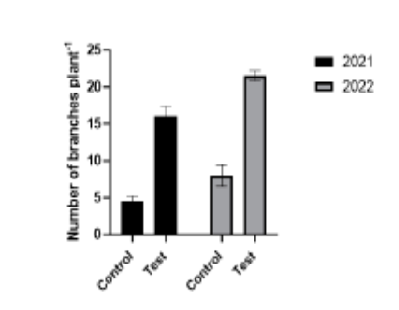


Indian Journal of Science and Technology
DOI: 10.17485/IJST/v16i41.2395
Year: 2023, Volume: 16, Issue: 41, Pages: 3673-3678
Original Article
Jigar T Mistry1*, Aditi S Bijalwan1, Yagnesh R Thakkar1
1Agrilogy Bioscience Pvt Ltd, 396045, Kewada, Valsad, Gujarat, India
*Corresponding Author
Email: [email protected]
Received Date:20 September 2023, Accepted Date:27 September 2023, Published Date:11 November 2023
Objective: In the present study, the efficacy of a commercial Vesicular Arbuscular Mycorrhizal (VAM) tablet formulation, Greenical VAMTM, comprising species Rhizophagus fasciculatus (NCBI Accession no. OR563927) and Rhizophagus intraradices (NCBI Accession no. OR563925), was assessed in relation to pomegranate plant growth. Methods: A structured field experiment was conducted with two distinct groups: a test set (inoculated with VAM) and a control set (uninoculated). Several key growth parameters, such as leaf area, shoot dry weight, number of branches per plant, and overall nutrient uptake, were systematically evaluated using GraphPad Prism 10. Findings: The results indicated that the green VAMTM inoculated plants exhibited significantly improved pomegranate growth compared to the control group. In 2022, the crop treated with Greenical VAMTM displayed a 2.32-fold increase in yield compared to the control. Novelty: This research represents the first study to apply the Greenical VAM™ formulation specifically to pomegranate plants. Furthermore, the findings have significant practical implications, suggesting that farmers can achieve enhanced pomegranate yields by utilizing this particular VAM formulation. Notably, each tablet exhibits a remarkably high sporic concentration (50,000 spores per gram) surpassing existing VAM formulations.
Keywords: Field trial, Greenical VAM TM, Plant Growth, Punica granatum L, Vesicular Arbuscular Mycorrhiza (VAM)
© 2023 Mistry et al. This is an open-access article distributed under the terms of the Creative Commons Attribution License, which permits unrestricted use, distribution, and reproduction in any medium, provided the original author and source are credited. Published By Indian Society for Education and Environment (iSee)
Subscribe now for latest articles and news.